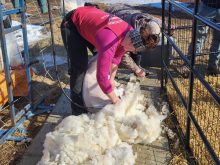Members of the largest beef organization in the United States accept the border is opening to Canadian cattle, but with some reservations.
The National Cattlemen’s Beef Association presented an 11 point list for its government to resolve before trade resumed.
President Jim McAdam said the group decided the long-term impact of keeping the border closed was more damaging than any short-term gains some producers felt they made without competition from Canada.
A major point was a demand not to resume trade with Canada until American beef was flowing back into Japan and South Korea. They conceded that may not happen.
Read Also

Charges laid after cattle theft
Saskatchewan RCMP lay two charges against a man after six cattle went missing.
“It became apparent talking to Japan and Korea that unless we were willing to follow the science, we weren’t going to convince them to follow the science,” he said in an interview July 15.
“By not dealing fairly with Canada, the U.S. could have egg on its face.”
However, on the matter of bluetongue and anaplasmosis, the Americans plan to pressure Canada into dropping its demand for disease testing before animals can come north.
Feeder cattle are allowed into Canada year round from areas specified to be disease free but the Americans want a broader rule to include breeding animals.
“We got a satisfactory resolution to U.S. feeders way back last summer but there was some onerous stuff in there we were concerned about,” he said.
In addition, his organization has some issues with the US Department of Agriculture over testing because a Texas cow was diagnosed with BSE in June after being ruled negative last November.

















